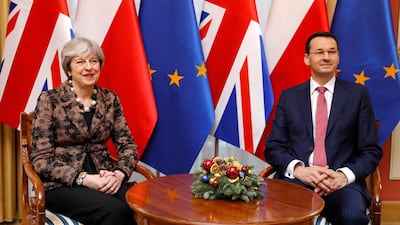Britain’s Prime Minister Theresa May has said Brexit will strengthen the UK’s ties with Poland, as she travels to Warsaw on Thursday to announce a new defence treaty with the eastern European nation.
Mrs May’s announcement comes one day after the European Union launched disciplinary proceedings against Poland over its plans to overhaul its judicial system.
At a bilateral summit attended by senior members of the British cabinet, including Foreign Secretary Boris Johnson and Chancellor Philip Hammond, the prime minister is expected to announce a new joint UK-Poland Treaty on Defence and Security Co-operation.
_______________
Read more:
Poland's 'refusal to accept Muslim migrants behind EU censure process'
Year in Review: Populism was on the march in 2017
_______________
"Poland matters greatly to the UK," Mrs May will say in a speech. "Our partnership is broad, vibrant and diverse and we both share a steadfast commitment to Europe's security and defence.
"I am determined that Brexit will not weaken our relationship with Poland. Rather, it will serve as a catalyst to strengthen it."
The treaty will provide a framework for enhanced defence cooperation as well as an agreement to counter Russian propaganda in the region, providing £5 million (Dh24.6m) for the project.
The UK has only one such similar treaty with another EU nation- France.
Mrs May is also expected to raise concerns about Warsaw’s judicial reforms plans with Polish Prime Minister Mateusz Morawiecki at the summit.
However, the prime minister will stop short of condemning Poland, according to Conservative politician Daniel Kawczynski, who had spoken to Mrs May before the trip.
"It's very, very important for the prime minister to back our Polish allies,” he told the BBC.
"This is a very important trading partner for the UK and a key Nato ally of ours."
Poland’s spat with the EU goes back two years when the ruling Law and Justice party introduced a series of measures, which gives the state greater control over the judiciary.
The European Commission launched disciplinary proceedings against Warsaw arguing the reforms threaten the rule of law and are a step towards authoritarianism.
However, in a show of defiance on Wednesday, Poland’s president Andrzej Duda said he had decided to sign the legislation on the judiciary.
While the Law and Justice party slammed the EU’s decision to rebuke Poland, saying that the decision was linked to the party’s policies on immigration, in particular its refusal to accept Muslim migrants.
"This may be an effect not only of the opposition's informing [on Poland to the European Commission] but also because we don't want to accept immigrants, we don't want to accept Muslim migrants, as we care for the security of Poles," Law and Justice spokeswoman Beata Mazurek said.

